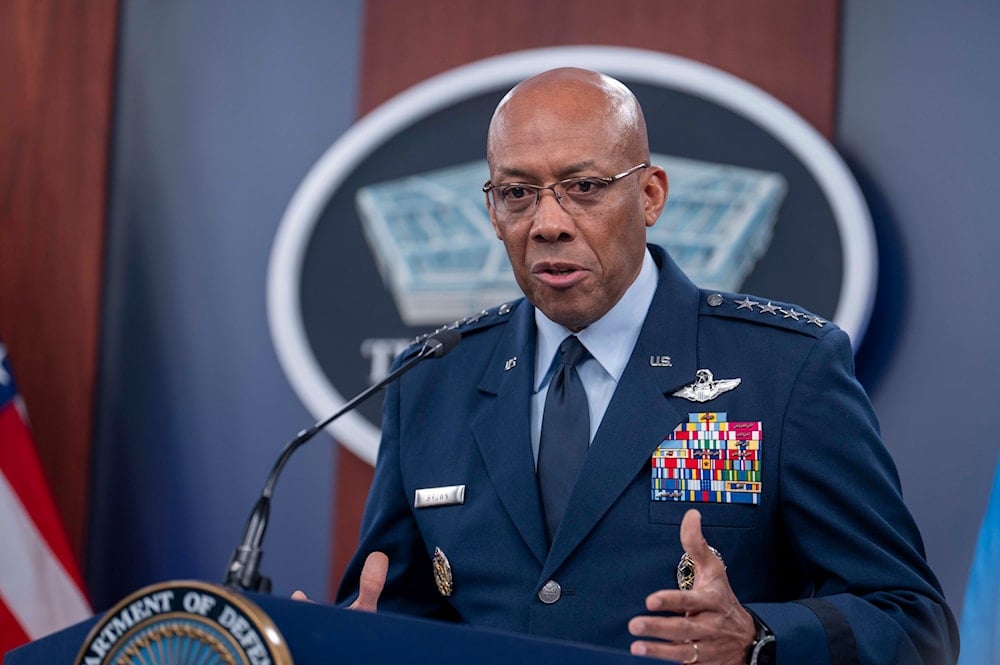Top US general says Hezbollah's response reduced risk of regional war
Top US General Charles Brown says the main factor determining the course and expansion of the war lies with the Iranian response to the assassination of Martyr Ismail Haniyeh.
-

Chairman of the Joint Chiefs of Staff Air Force Gen. Charles Q. Brown Jr., speaks during a press briefing at the Pentagon on Thursday, July 25, 2024, in Washington. (AP)
The risk of a regional war in the Middle East has been reduced after Hezbollah responded to the Israeli assassination of its senior military commander, Martyr Fouad Shokor while ensuring that tensions do not escalate, the top US general stated on Monday, pointing out that the Iranian response to the assassination of Hamas political chief Ismail Haniyeh, however, has transcended into the key determiner of whether the scope of the war would expand.
Air Force General Charles Q. Brown, chairman of the Joint Chiefs of Staff, told Reuters that Hezbollah's retaliatory operation was "one of two major threatened attacks against Israel." While the operation succeeded without any direct threats of escalation, Brown said "it depends on how the second is going to play out," referring to the Iranian response to the Israeli assassination of Martyr Haniyeh in Tehran.
When asked about Hezbollah's military power, especially after the alleged Israeli "preemptive strikes", Brown confirmed, "They still have capability."
Although the top general confirmed that the risk of a regional war has "somewhat" decreased, he still cautioned that the impending Iranian operation would determine the fate of the region.
"How Iran responds will dictate how Israel responds, which will dictate whether there is going to be a broader conflict or not," Brown indicated.
He also warned of the risks posed by the Axis of Resistance factions in regions like Iraq, Syria, and Jordan, who have carried out attacks against US troops, as well as by the Yemeni Armed Forces, which he described as the "wild card".
Brown revealed that the US military was better stationed to "defend" the Israeli occupation entity and its own forces in the region, that it was on April 13, when Iran sent hundreds of drones and missiles at Israeli targets in occupied territories in response to the Israeli aggression on its consulate in Damascus.
Hezbollah confirmed on Sunday that it launched an "initial response" to the assassination of Commander Martyr Fouad Shokor by launching a large number of drones deep into the occupied Palestinian territories.
The Islamic Resistance in Lebanon clarified that the attack targeted a strategic Israeli military site.
Meanwhile, "Israel" claimed that in a "preemptive strike", it had targeted thousands of Hezbollah rocket launchers simultaneously with some 100 fighter jets.
Later, Hezbollah Secretary-General Sayyed Hassan Nasrallah announced that the primary targets of Sunday's operation were the central Glilot base of Israeli military intelligence Aman, incorporating the central hub of Unit 8200, located near Tel Aviv, and the Ein Shemer airbase.
He confirmed that "a significant number of drones hit their intended targets, but the enemy is keeping all relevant details concealed."
Sayyed Nasrallah explained that the operation entailed two phases. The initial phase was focused on targeting sites and barracks in northern occupied Palestine with the hundreds of intended rockets to exhaust and deplete the Iron Dome and interceptor missiles, which paved the way for phase two, which saw the swarms of drones heading toward their intended targets.
The Lebanese Resistance leader debunked all Israeli claims of a preemptive attack targeting Hezbollah's weapon launchers, pointing out that "the enemy's claims about bombing strategic and precise missiles that were prepared to target Tel Aviv are a lie upon a lie," and noting that the Resistance, with a clear and precise strategy, had no intention of using such weapons.
Read more: US provided 'Israel' with intel during Hezbollah's response: Pentagon

 4 Min Read
4 Min Read








